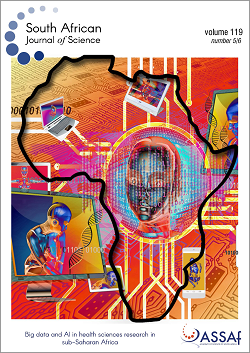Public health research using cell phone derived mobility data in sub-Saharan Africa: Ethical issues
DOI:
https://doi.org/10.17159/sajs.2023/14777Keywords:
ethics, mobility data, public health, community engagement, surveillanceAbstract
The movements of humans have a significant impact on population health. While studies of such movements are as old as public health itself, the COVID-19 pandemic has raised the profile of mobility research using digital technologies to track transmission routes and calculate the effects of health policies, such as lockdowns. In sub-Saharan Africa, the high prevalence of cell phone and smartphone use is a source of potentially valuable mobility data for public health purposes. Researchers can access call data records, passively collected in real time from millions of clients by cell phone companies, and associate these records with other data sets to generate insights, make predictions or draw possible policy implications. The use of mobility data from this source could have a range of significant benefits for society, from better control of infectious diseases, improved city planning, more efficient transportation systems and the optimisation of health resources. We discuss key ethical issues raised by public health studies using mobility data from cell phones in sub-Saharan Africa and identify six key ethical challenge areas: autonomy, including consent and individual or group privacy; bias and representativeness; community awareness, engagement and trust; function creep and accountability; stakeholder relationships and power dynamics; and the translation of mobility analyses into health policy. We emphasise the ethical importance of narrowing knowledge gaps between researchers, policymakers and the general public. Given that individuals do not really provide valid consent for the research use of phone data tracking their movements, community understanding and input will be crucial to the maintenance of public trust.
Significance:
- Mobility data derived from cell phones are being increasingly used for health research and public health purposes in sub-Saharan Africa, with minimal individual consent and largely without public awareness.
- While such data can have significant potential public health benefits, risks and concerns related to their collection and use in sub-Saharan African contexts have not been widely discussed.
- Innovative community engagement initiatives, which are appropriate and responsive to sub-Saharan African contexts, need to be developed to address ethical challenge areas and help warrant public trust in mobility research.
Published
Issue
Section
License

All articles are published under a Creative Commons Attribution 4.0 International Licence
Copyright is retained by the authors. Readers are welcome to reproduce, share and adapt the content without permission provided the source is attributed.
Disclaimer: The publisher and editors accept no responsibility for statements made by the authors
How to Cite
- Abstract 1051
- PDF 1065
- EPUB 464
- XML 528
Funding data
-
National Institutes of Health
Grant numbers U01MH127704












.png)